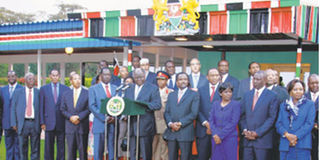Statute could cost country dearly

President Kibaki, Prime Minister Odinga and other members of the Cabinet after a meeting. The idea of pulling Kenya out of the Rome Treaty was first discussed at a Cabinet meeting on July 30, last year. File Photo
The plot to ditch the International Criminal Court has been in the works for the last 18 months.
The idea was first mooted at a Cabinet meeting on July 30, last year.
In the meeting at State House Nairobi, attended by President Kibaki and Prime Minister Raila Odinga, the Cabinet explored “withdrawal from the Rome Statute under Article 127 and repeal of the International Crimes Act, 2008”.
The brief from that July meeting noted that the withdrawal from the Rome Statute was among the key issues discussed “extensively and exhaustively”.
But the idea was put on ice when the Cabinet agreed to cooperate with the ICC and fulfil its obligations under the Rome Statute.
The Cabinet brief reveals a strong resolve to have the perpetrators of the post-poll violence tried locally; with three out of the four resolutions trumpeting a local process.
This means Parliament’s resolution to force the government to opt out of the International Criminal Court may well be the signal the Cabinet was waiting for to reach a decision on the matter.
“The Cabinet resolves (that) it will undertake accelerated and far-reaching reforms in the judiciary, police, and investigative arms of Government to enable them investigate, prosecute and try perpetrators of post-election violence locally,” read one of the resolutions.
There was also a commitment to deal with “all forms of impunity, including extra-judicial killings, corruption, and fraudulent or unlawful acquisition of public land and other public assets.” The Cabinet also resolved to amend the Truth, Justice and Reconciliation Act to make the commission more “effective and representative”.
Eighteen months later, no amendments have been effected on the Act, and the commission is fighting integrity questions.
After the meeting, a rare news conference was held right outside State House Nairobi. Finance Minister Uhuru Kenyatta and then Agriculture Minister William Ruto stood next to each other clad in maroon ties and white shirts.
Behind Mr Kenyatta was Industrialization minister Henry Kosgey. All the three have been named as suspected masterminds of the post-election chaos.
When ICC Prosecutor Luis Moreno-Ocampo named the six suspects, President Kibaki said he hoped the ICC process will meet Kenya’s expectations.




